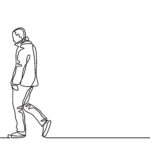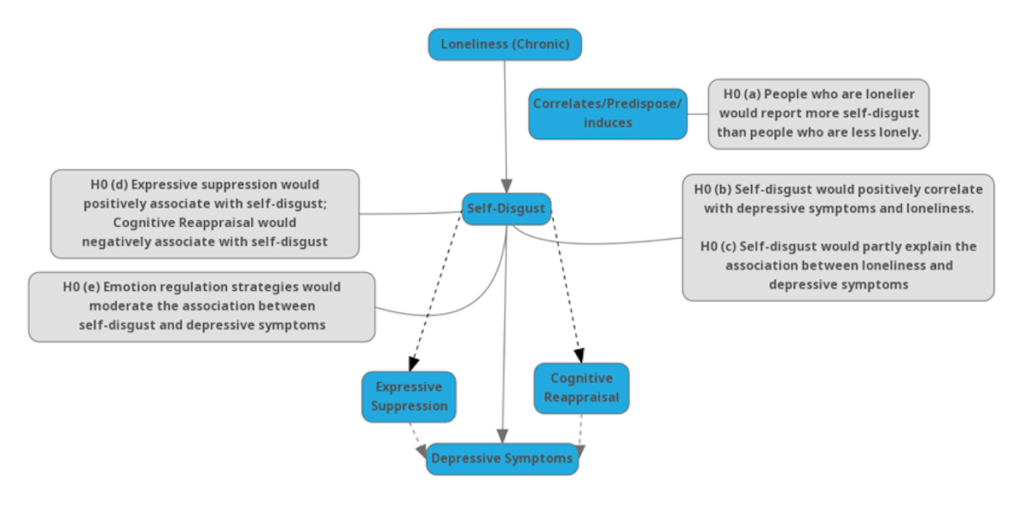
“Loneliness and the feeling of being unwanted is the most terrible poverty.”
– Mother Teresa.
Loneliness is said to be a growing problem in industrialised countries with almost as many as a third of people reporting feelings of loneliness (Cacioppo & Cacioppo, 2018). This is concerning as loneliness is associated with a number of both physical and mental health conditions, such as coronary heart disease (Valtorta et al. 2016) and depression (Cacioppo et al. 2006).
Although an association has been reported, it is still unclear how loneliness might actually lead to depression. One suggestion is that self-disgust may play a role in this relationship as not only is self-disgust also a predictor of depression but loneliness tends to elicit negative thoughts and feelings towards oneself – including disgust (Heinrich & Gullone, 2006). Furthermore, understanding the cause and effect relationship between loneliness, self-disgust and depression could inform potential depression prevention and intervention strategies.
Ypsilanti et al. (2019) sought to understand whether loneliness induces self-disgust which in turn mediates the relationship between loneliness and depression. They further investigated whether emotional regulation strategies, such as cognitive reappraisal and expressive suppression, would influence the relationship between self-disgust and depression as such strategies have previously been implicated in the development of depressive symptoms.

Loneliness and self-disgust are independent predictors of depression.
Methods
In the current study (Ypsilanti et al, 2019), both loneliness and self-disgust were understood as subjectively conceived thoughts and/or experiences. Loneliness was defined as a negative affective state induced by a discrepancy in one’s social needs and the degree to which these were satisfied (Cacioppo & Hawkley, 2009). Self-disgust referred to the negative self-conscious mindset towards oneself (physical self-disgust) or one’s actions (behavioural self-disgust) (Overton et al., 2008).
A cross-sectional survey was self-completed online by participants who attended a university open day in England. The data collected via the survey included:
- Demographics – age, gender, nationality;
- Loneliness – using the University of California Loneliness Scale (UCLA);
- Self-disgust – using the Self-Disgust Scale (SDS) the following were measured:
- Behavioural self-disgust; and
- Physical self-disgust;
- Depressive Symptoms – using Beck’s Depression Inventory (BDI);
- Emotion Regulation: using the Emotion Regulation Questionnaire (ERQ) which consists of two subscales:
- Expressive suppression; and
- Cognitive reappraisal.
The authors initially explored associations in the data using correlations and then conducted a bootstrapped linear regression to test their hypotheses. They used regression-based mediation analyses to test whether self-disgust was the route through which lonely individuals develop depressive symptoms and employed moderated regression analyses to test whether emotional regulation strategies influence the relationship between self-disgust and depression.

A pictorial depiction of the constructs and hypotheses of Ypsilanti et al. (2019)(Blue boxes – measured constructs; Grey boxes – 5 main hypotheses of the study). The lines depict the directionality of the relationships amongst constructs, and where the hypothesised effects would be.
Results
Three-hundred and seventeen cases were used in the complete-case analysis. Participants’ age ranged between 18 and 72 years (M = 29.29, SD = 14.11), 76.9% were females, and 78% were British.
Hypothesis 1
People who are lonelier would report more self-disgust than people who are less lonely.
- A linear relationship between loneliness and self-disgust was found such that the higher loneliness score was, the more self-disgust was experienced.
Hypothesis 2
Self-disgust would be positively associated with both depression and loneliness but predict depressive symptoms independent of the effects of loneliness
- Both physical and behavioural self-disgust independently predicted depressive symptoms after controlling for age, gender, loneliness and emotion regulation strategies.
Hypothesis 3
Self-disgust would partly explain the association between loneliness and depressive symptoms.
- Both physical and behavioural self-disgust mediated the association between loneliness and depressive symptoms.
Hypothesis 4
Emotion regulation strategies, expressive suppression and cognitive reappraisal, would positively and negatively associate with self-disgust respectively.
- Expressive suppression positively correlated with self-disgust and cognitive reappraisal correlated negatively with self-disgust as hypothesised by the authors.
Hypothesis 5
Emotion regulation strategies (i.e., cognitive reappraisal and expressive suppression) would moderate the relationship between self-disgust and depressive symptoms.
- The moderation analysis models found that expressive suppression influenced the relationship between physical self-disgust and depressive symptoms such that the association was stronger when the score for expressive suppression was higher. No other significant interactions between the different emotion regulation strategies and self-disgust were found.

Self-disgust explained the association between loneliness and depression with emotional regulation strategies moderating the relationship between self-disgust and depression.
Conclusions
Ypsilanti and colleagues concluded that self-disgust may represent an affective mechanism through which loneliness progresses to the development of depressive symptoms. They further suggested that emotion regulation strategies may be a potential intervention target for supporting students experiencing depressive symptoms.
Strengths and limitations
This study used a clear step-wise theoretical framework in investigating the role of self-disgust and emotion regulation strategies in the relationship between loneliness and depression. This approach provided insight into the inter-relationship between the subjective psychological states of lonely people, and potential windows of intervention to prevent or slow down the transition into depression.
Some limitations of the study include:
- The ability to infer causality was limited by the cross-sectional design;
- Some key elements of the study are not clearly presented, which undermines the validity and generalisability of the findings;
- Gender was reported to be significantly positively correlated with depressive symptoms and physical self-disgust, and negatively correlated with both expressive suppression and cognitive reappraisal (Table 2 in the paper). This was unaddressed in the interpretation of the findings. The use of bootstrapping, or repeated sampling, of a biased sample would not make the sample more representative of the true population.
- No explanation was explored for how expressive suppression selectively associated with physical but not behavioural self-disgust.
- The authors provided a very weak justification for the inclusion of emotion regulation strategies in the analyses, simply arguing that self-disgust involves an affective appraisal of the self and emotion regulation strategies are associated with depression and therefore it is “theoretically plausible” that these variables may be connected. The authors also failed to identify any substantial clinical implications of the relationship between emotion regulation, depression, and self-disgust.
- The study participants comprised mainly university students but the authors’ findings are reported as applying to the general population which may not hold true.

The sample had more women than men and gender was associated with depressive symptoms, but why did the authors not explore this further?
Implications for practice
This paper demonstrates that self-disgust may partly account for the development of depressive symptoms in lonely individuals. More robust study designs and evidence are needed to validate the current study.
Novel interventions for loneliness such as social prescribing are being developed day by day. Concurrent maladaptive psychological constructs such as self-disgust should be considered, such that we could develop a better understanding of the different affective pathways loneliness could lead to depression. Clinicians can then match the active ingredients of these interventions with individual needs.
Emotion regulation strategies could be a modifiable protective factor for depression in lonely individuals. Temporal inter-relationship between emotional regulation strategies and affective self-conscious states would be better understood using real-time data-collection methods, such as ecological momentary assessments.

Could interventions for loneliness target emotion regulation strategies to prevent depression in lonely individuals?
Statement of interest
None.
Links
Primary paper
Ypsilanti, A., Lazuras, L., Powell, P., & Overton, P. (2019). Self-disgust as a potential mechanism explaining the association between loneliness and depression. Journal of Affective Disorders, 243, 108-115.
Other references
Cacioppo, J. T., & Cacioppo, S. (2018). The growing problem of loneliness. The Lancet, 391(10119), 426.
James, S. L., Abate, D., Abate, K. H. et al. (2018). Global, regional, and national incidence, prevalence, and years lived with disability for 354 diseases and injuries for 195 countries and territories, 1990–2017: a systematic analysis for the Global Burden of Disease Study 2017. The Lancet, 392(10159), 1789-1858. [Abstract]
Heinrich, L. M., & Gullone, E. (2006). The clinical significance of loneliness: A literature review. Clinical psychology review, 26(6), 695-718. [Abstract]
Cacioppo, J. T., Hughes, M. E., Waite, L. J., Hawkley, L. C., & Thisted, R. A. (2006). Loneliness as a specific risk factor for depressive symptoms: cross-sectional and longitudinal analyses. Psychology and aging, 21(1), 140. [Abstract]
Powell, P. A., Simpson, J., & Overton, P. G. (2013). When disgust leads to dysphoria: A three-wave longitudinal study assessing the temporal relationship between self-disgust and depressive symptoms. Cognition & Emotion, 27(5), 900-913. [Abstract]
Cacioppo, J. T., & Hawkley, L. C. (2009). Perceived social isolation and cognition. Trends in cognitive sciences, 13(10), 447-454. [Abstract]
Overton, P. G., Markland, F. E., Taggart, H. S., Bagshaw, G. L., & Simpson, J. (2008). Self-disgust mediates the relationship between dysfunctional cognitions and depressive symptomatology. Emotion, 8(3), 379. [Abstract]
Valtorta, N. K., Kanaan, M., Gilbody, S., Ronzi, S., & Hanratty, B. (2016). Loneliness and social isolation as risk factors for coronary heart disease and stroke: systematic review and meta-analysis of longitudinal observational studies. Heart, 102(13), 1009-1016.
Photo credits
- Photo by Sasha Freemind on Unsplash
- Photo by Joseph Lam
- Photo by Tengyart on Unsplash
- Photo by Kelly Sikkema on Unsplash
- Photo by Will Porada on Unsplash

Interesting study. There is a longitudinal prospective Dutch study which measured loneliness and depressive symptoms associated with excessive all cause mortality and infers that severity of depression important risk factor in men for latter, which indirectly contributes to further potential reinforcing risk that include physical health.
Holweda et al: Impact of loneliness and depression in mortality – longitudinal aging study in Amsterdam – BJPsych 2016, 209, pages 127 – 134.